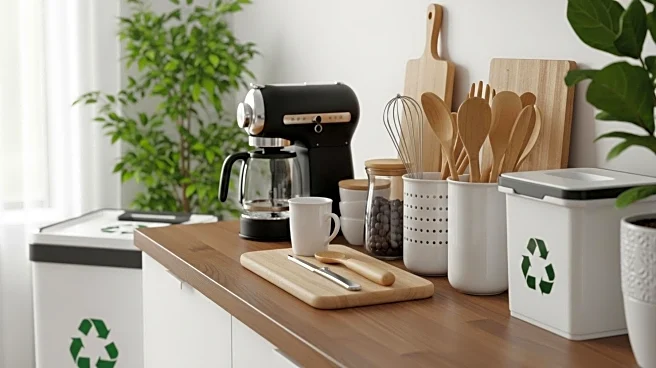What's Happening?
Ikea has initiated the 'Year of Cooking and Eating' with a pop-up experience in New York City's Union Square, running from October 2 to 26. This event is part of a broader effort to enhance food-related offerings and sustainability practices. The pop-up features a kitchen planning studio, daily happy hours, children's scavenger hunts, and various kitchen demos. Ikea plans to introduce over 200 new food-related products, including dining tables and storage solutions aimed at reducing food waste. Additionally, Ikea has partnered with Vanguard Renewables to launch a food waste collection program at five U.S. stores. This initiative will convert food waste into renewable natural gas and low-carbon fertilizer, diverting approximately 250 pounds of waste per week per unit. The pilot program is expected to divert over 32,000 pounds of waste during its six-month duration.
Why It's Important?
Ikea's initiatives reflect a growing trend among businesses to integrate sustainability into their operations. By focusing on food waste reduction and renewable energy, Ikea is addressing environmental concerns and supporting local agriculture. The introduction of plant-based menu options and reduced restaurant prices also aligns with consumer demand for affordable and sustainable food choices. These efforts not only enhance Ikea's brand image but also contribute to broader environmental goals, potentially influencing other companies to adopt similar practices. The partnership with Vanguard Renewables highlights the importance of collaboration in achieving sustainability objectives, offering a model for other retailers to follow.
What's Next?
Following the pilot program, Ikea plans to expand its food waste recycling initiative to additional locations. This expansion could lead to significant reductions in food waste across its U.S. operations, further supporting local agriculture and renewable energy production. Ikea's continued focus on sustainability may drive innovation in product offerings and operational practices, potentially setting new standards in the retail industry. Stakeholders, including environmental groups and local communities, are likely to monitor the program's outcomes and advocate for broader implementation. Ikea's efforts may also prompt discussions on regulatory incentives for businesses that prioritize sustainability.
Beyond the Headlines
Ikea's initiatives may have deeper implications for the retail industry, particularly in terms of ethical and cultural shifts. By promoting plant-based options and reducing food waste, Ikea is contributing to a cultural movement towards more sustainable consumption patterns. This shift could influence consumer behavior, encouraging individuals to make environmentally conscious choices. Additionally, Ikea's focus on sustainability may raise ethical considerations regarding corporate responsibility and the role of businesses in addressing global challenges. As consumers increasingly prioritize sustainability, companies may face pressure to adopt ethical practices and transparently report their environmental impact.








